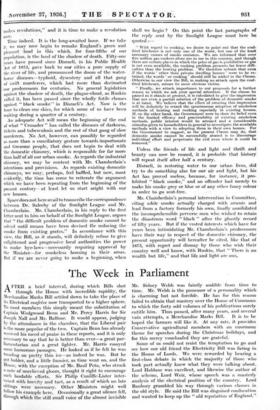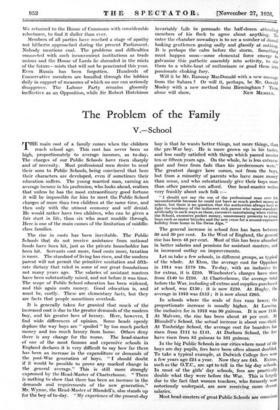The Week in Parliament
AFTER a brief interval, during which Bills shot through the House with incredible rapidity, the Merchandise Marks Bill settled down to take the place of its Electrical confrere now transported to a higher sphere. To most members this simply meant the substitution of Captain Wedgwood Benn and Mr. Percy Harris for Sir Joseph Nall and Mr. Balfour. It would appear, judging by the attendance in the chamber, that the Liberal pair is the more popular of the two. Captain Benn has already received his meed of praise in these reports, and it is only necessary to say that he is better than ever—a great par- liamentarian and a great fighter. Mr. Harris essayed some humorous passages. He looked as if he felt he was treading on pretty thin ice—as indeed he was. But he got bolder, and a little funnier, as time went on, and the House, with the exception of Mr. Basil Peto, who struck a note of unrelieved gloom, thought it right to encourage such laudable efforts. Sir Philip Cunliffe-Lister inter- vened with brevity and tact, as a result of which no late sittings were necessary. Other Ministers might well follow his example here.. Occasionally a great silence fell, through which the still small voice of the almost invisible Mr. Sidney Webb was faintly audible from time to time. Mr. Webb is the possessor of a personality which is charming but not forcible. He has for this reason failed to obtain that mastery over the House of Commons to which the forty odd volumes of his publications surely entitle him. Thus passed, after many years, and several vain attempts, a Merchandise Marks Bill. It is to be hoped the farmers will like it. At any rate, it provides Conservative agricultural members with an enormous theme for speeches during the Christmas holidays, and for this mercy vouchsafed they are grateful.
Some of us could not resist the temptation to go and see how our old friend the Electricity Bill was faring in the House of Lords. We were rewarded by hearing a first-class debate in which the majority of those who took part actually knew what they were talking about. Lord Haldane was excellent, and likewise the author of the scheme, Lord Weir, whose speech was a masterly analysis of the electrical position of the country. Lord Banbury grumbled his way through various clauses in the old style. - He said the Bill was disguised confiscation and wanted to keep up the " old reputation 9f England." We returned to. the house of Commons with considerable reluctance, to find it duller than ever.
Members of all parties have reached a stage of apathy not hitherto approached during the present Parliament. Nobody mentions coal. The problems and difficulties connected with such inconvenient institutions as trade unions and the House of Lords lie shrouded in the mists of the future—mists that will not be penetrated this year. Even Russia has been forgotten. Hundreds of Conservative members are bundled through the lobbies daily in support of measures of which no one can seriously disapprove. The Labour Party remains gloomily ineffective as an Opposition, while Sir Robert Hutchison invariably fails to persuade the half-dozen attending members of his flock to agree about anything. To enter the chamber nowadays is to see a number of dismal looking gentlemen gazing sadly and glassily at nothing. It is perhaps the calm before the storm. Something must happen soon—some elemental force emerge to galvanize this pathetic assembly into activity, to stir them to a white-heat of enthusiasm or goad them into passionate choking fury.
Will it be Mr. Ramsay MacDonald with a new message from the Sahara ? Or will it, perhaps, be Mr. Oswald Mosley with a new method from Birmingham ? Time



















































 Previous page
Previous page